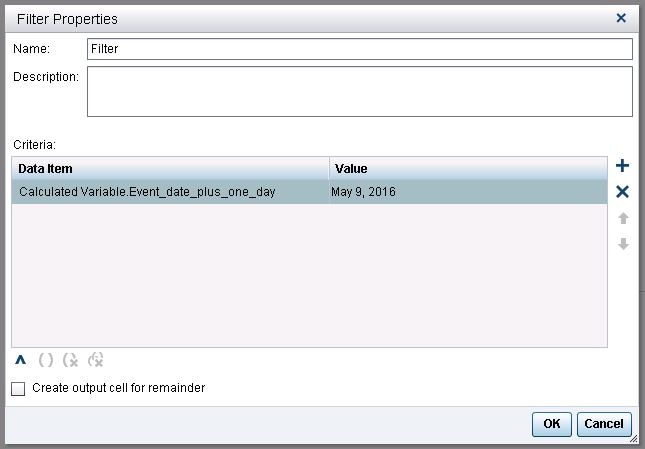Problem Note 58185: Using the INTNX function in a decision campaign might produce unexpected results in SAS® Real-Time Decision Manager
 |  |  |  |
If your decision campaign includes a calculated variable with an INTNX function, you might see unexpected results, as described below.
Consider this simple decision campaign:

The Filter node is set to filter on the value of a calculated variable called Event_date_plus_one_day with this expression: INTNX('day',<<events.date>>,1)
(In the expression above, events.date is an event variable with a DATE data type).
So, for example, if the Filter node criteria is set as shown below, you would expect records where the events.date variable value is May 10, 2016 to be selected by the filter and to continue in the flow.

However, this might be true only if the time zone in effect for the SAS Real-Time Decision Manager environment is set to Greenwich Mean Time. If the environment has a different time zone in effect (for example, Central European Time), then different results might occur, depending on the value of the time part of the date event variable.
For example, if the time zone is set to Central European Time and the event variable is set to a value between May 9, 2016 00:00AM and May 9, 2016 01:59AM, then the criteria that is in the Filter node is not met and the record is dropped. If the event variable is set to May 9, 2016 with any other time, then the criteria that is in the Filter node is met, as expected, and the record is selected.
Therefore, SAS Technical Support recommends that you do not use the INTNX function in SAS Real-Time Decision Manager to calculate day time periods in this way unless the time zone of Greenwich Mean Time is in effect.
Click the Hot Fix tab in this note to access the hot fix for this issue.
After you apply this hot fix, contact SAS Technical Support for guidance about using the new functionality in the hot fix.
Operating System and Release Information
| Product Family | Product | System | Product Release | SAS Release | ||
| Reported | Fixed* | Reported | Fixed* | |||
| SAS System | SAS Real-Time Decision Manager | Microsoft® Windows® for x64 | 6.4 | 6.6 | 9.4 TS1M2 | 9.4 TS1M6 |
| Microsoft Windows 8 Enterprise 32-bit | 6.4 | 6.6 | 9.4 TS1M2 | 9.4 TS1M6 | ||
| Microsoft Windows 8 Enterprise x64 | 6.4 | 6.6 | 9.4 TS1M2 | 9.4 TS1M6 | ||
| Microsoft Windows 8 Pro 32-bit | 6.4 | 6.6 | 9.4 TS1M2 | 9.4 TS1M6 | ||
| Microsoft Windows 8 Pro x64 | 6.4 | 6.6 | 9.4 TS1M2 | 9.4 TS1M6 | ||
| Microsoft Windows 8.1 Enterprise 32-bit | 6.4 | 6.6 | 9.4 TS1M2 | 9.4 TS1M6 | ||
| Microsoft Windows 8.1 Enterprise x64 | 6.4 | 6.6 | 9.4 TS1M2 | 9.4 TS1M6 | ||
| Microsoft Windows 8.1 Pro 32-bit | 6.4 | 6.6 | 9.4 TS1M2 | 9.4 TS1M6 | ||
| Microsoft Windows 8.1 Pro x64 | 6.4 | 6.6 | 9.4 TS1M2 | 9.4 TS1M6 | ||
| Microsoft Windows 10 | 6.4 | 6.6 | 9.4 TS1M2 | 9.4 TS1M6 | ||
| Microsoft Windows Server 2008 | 6.4 | 9.4 TS1M2 | ||||
| Microsoft Windows Server 2008 R2 | 6.4 | 9.4 TS1M2 | ||||
| Microsoft Windows Server 2008 for x64 | 6.4 | 9.4 TS1M2 | ||||
| Microsoft Windows Server 2012 Datacenter | 6.4 | 6.6 | 9.4 TS1M2 | 9.4 TS1M6 | ||
| Microsoft Windows Server 2012 R2 Datacenter | 6.4 | 6.6 | 9.4 TS1M2 | 9.4 TS1M6 | ||
| Microsoft Windows Server 2012 R2 Std | 6.4 | 6.6 | 9.4 TS1M2 | 9.4 TS1M6 | ||
| Microsoft Windows Server 2012 Std | 6.4 | 6.6 | 9.4 TS1M2 | 9.4 TS1M6 | ||
| Windows 7 Enterprise 32 bit | 6.4 | 6.6 | 9.4 TS1M2 | 9.4 TS1M6 | ||
| Windows 7 Enterprise x64 | 6.4 | 6.6 | 9.4 TS1M2 | 9.4 TS1M6 | ||
| Windows 7 Home Premium 32 bit | 6.4 | 6.6 | 9.4 TS1M2 | 9.4 TS1M6 | ||
| Windows 7 Home Premium x64 | 6.4 | 6.6 | 9.4 TS1M2 | 9.4 TS1M6 | ||
| Windows 7 Professional 32 bit | 6.4 | 6.6 | 9.4 TS1M2 | 9.4 TS1M6 | ||
| Windows 7 Professional x64 | 6.4 | 6.6 | 9.4 TS1M2 | 9.4 TS1M6 | ||
| Windows 7 Ultimate 32 bit | 6.4 | 6.6 | 9.4 TS1M2 | 9.4 TS1M6 | ||
| Windows 7 Ultimate x64 | 6.4 | 6.6 | 9.4 TS1M2 | 9.4 TS1M6 | ||
| 64-bit Enabled AIX | 6.4 | 6.6 | 9.4 TS1M2 | 9.4 TS1M6 | ||
| 64-bit Enabled Solaris | 6.4 | 6.6 | 9.4 TS1M2 | 9.4 TS1M6 | ||
| HP-UX IPF | 6.4 | 6.6 | 9.4 TS1M2 | 9.4 TS1M6 | ||
| Linux for x64 | 6.4 | 6.6 | 9.4 TS1M2 | 9.4 TS1M6 | ||
| Solaris for x64 | 6.4 | 6.6 | 9.4 TS1M2 | 9.4 TS1M6 | ||
A fix for this issue for SAS Decision Services 6.4 is available at:
https://tshf.sas.com/techsup/download/hotfix/HF2/V46.html#58185| Type: | Problem Note |
| Priority: | medium |
| Date Modified: | 2016-05-27 08:53:45 |
| Date Created: | 2016-05-09 11:59:43 |